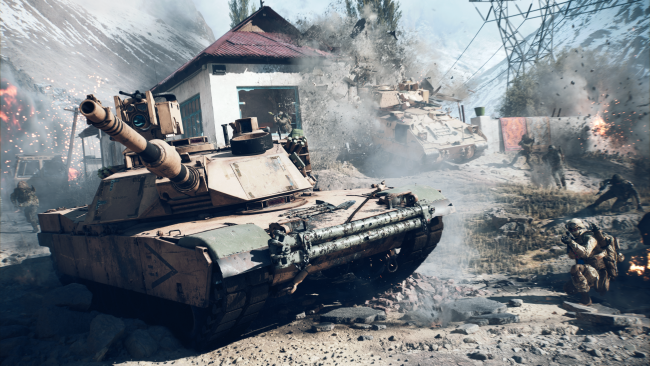When people talk about first-person shooters, Battlefield is always one of the heavy hitters. This franchise has been shaping multiplayer gaming for years with its large-scale battles, realistic warfare, and focus on teamwork. Unlike many other shooters, Battlefield thrives on chaos in the best way possible, giving players epic moments they can’t get anywhere else.
The Origins of Battlefield
The first Battlefield game, Battlefield 1942, dropped in 2002 and instantly made waves. What made it stand out was the scale. Players weren’t just running around small maps with a few weapons. Instead, they were thrown into massive arenas filled with vehicles, aircraft, and dozens of teammates. The game captured the feeling of being part of a huge war rather than just a lone soldier. From that point, Battlefield carved its identity as the shooter for players who wanted something bigger and more strategic.
Read More: Doom: The Game That Redefined First-Person Shooters
Battlefield Versus Other Shooters
One of the constant conversations in the gaming world is how Battlefield compares to Call of Duty. Both franchises are huge, but they cater to different styles of play. Call of Duty is fast, tight, and arcade-like, while Battlefield leans into sprawling maps, teamwork, and immersion. Some players love the rush of COD’s close-quarters fights, but others prefer the tactical depth that Battlefield delivers. It’s like comparing a quick boxing match with a full-scale war movie.
Read More: The Enduring Magic of Final Fantasy
The Scale of the Battlefield Experience
What sets Battlefield apart is the sense of scale. You’re not just dealing with a handful of enemies, you’re in the middle of a warzone with tanks rolling past, jets flying overhead, and buildings collapsing in real-time. The maps are designed to feel alive, with dynamic environments and destruction that can change the flow of a match instantly. That moment when a skyscraper crumbles in Battlefield 4 is etched into gaming history. This level of chaos makes every match feel unpredictable and exciting.
Read More: Exploring the Legacy of Assassin’s Creed
The Role of Teamwork in Battlefield
Unlike many shooters where you can lone-wolf your way to victory, Battlefield rewards players who work together. Squads play a huge role in the flow of each match. Medics keep teammates alive, engineers repair vehicles, and support players provide ammo. Every role has importance, and when a squad works in sync, the results can turn the tide of battle. This teamwork aspect makes Battlefield more than just a shooter—it’s a war simulator that thrives on cooperation.
Read More: Introduction to Terraria
Iconic Titles in the Battlefield Franchise
Over the years, Battlefield has delivered some truly iconic entries. Battlefield 2 expanded on the formula with deeper gameplay. Battlefield Bad Company 2 became a fan favorite thanks to its humor and impressive destruction. Battlefield 3 and Battlefield 4 are often remembered as the peak of the series, offering modern settings with massive battles. Then there’s Battlefield 1, which shocked fans by going back to World War I, giving players trench warfare and biplane dogfights. Each game brought something unique to the table while keeping that core Battlefield spirit intact.
The Visual Power of Battlefield
One of the things that always makes Battlefield stand out is its visual presentation. Powered by the Frostbite engine, the games look stunning. Explosions feel cinematic, lighting is realistic, and the environments are full of detail. Watching a tank roll through mud or a jet streak across the sky feels like a moment from a blockbuster movie. For players who love immersion, Battlefield is unmatched. The audio design deserves praise too, with gunfire, explosions, and soldier chatter making every match sound authentic.
Battlefield Campaigns and Stories
While Battlefield is best known for multiplayer, the franchise has experimented with single-player campaigns. Battlefield Bad Company brought humor and personality into the mix, with a squad of misfit soldiers going on wild adventures. Later entries like Battlefield 1 told powerful war stories from multiple perspectives, giving players a glimpse into the human side of conflict. These campaigns may not be the main draw, but they add depth to the overall experience.
The Evolution of Battlefield Multiplayer
Over time, Battlefield multiplayer has evolved to keep up with changing trends. From the class-based system of older games to large-scale modes with up to 128 players in newer titles, the franchise has consistently pushed boundaries. The introduction of modes like Conquest and Rush gave players unique objectives that required teamwork and strategy. More recent entries have added dynamic weather systems and large-scale events that shake up battles mid-match, keeping the experience fresh.
The Challenges Faced by Battlefield
Of course, not every Battlefield release has been perfect. Some games launched with technical issues, balancing problems, or community backlash. Battlefield 2042, for instance, faced criticism for missing features and rough performance at launch. However, the developers have been working hard to improve the experience through updates and patches. Despite the bumps along the way, the passion of the fanbase keeps the franchise alive and thriving.
Why Battlefield Moments Are Legendary
Ask any fan about their favorite Battlefield memory, and you’ll probably hear some wild stories. Maybe it’s parachuting out of a jet, pulling off a rocket launcher shot mid-air, or coordinating with a squad to capture a critical objective. These unscripted, cinematic moments are what make Battlefield special. No two matches ever feel the same, and the chaos creates stories that players love to share.
The Future of Battlefield
Looking ahead, the future of Battlefield is full of potential. Fans are hoping the franchise leans back into its roots with deeper teamwork mechanics, immersive environments, and the large-scale destruction that made it famous. With modern technology, there’s no limit to how realistic and intense future entries can become. Whether it’s exploring new historical settings or pushing forward into futuristic battles, Battlefield still has plenty of room to grow and surprise players
